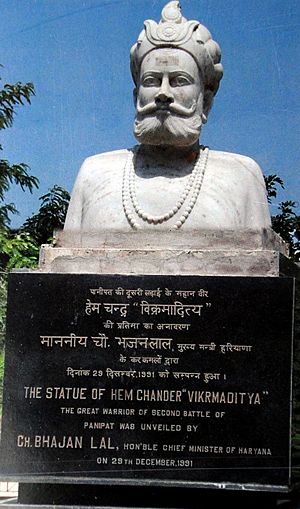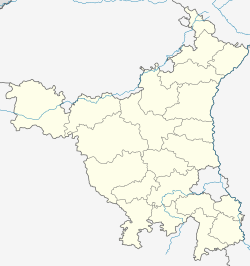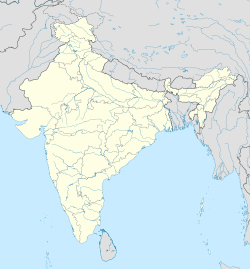Panipat facts for kids
Quick facts for kids
Panipat
|
|
|---|---|
|
City
|
|
| Country | |
| State | Haryana |
| District | Panipat |
| Area | |
| • Total | 64 km2 (25 sq mi) |
| Elevation | 219 m (719 ft) |
| Population
(2011)
|
|
| • Total | 295,970 |
| • Density | 4,620/km2 (11,980/sq mi) |
| Language | |
| • Official | Hindi, Punjabi |
| Time zone | UTC+5:30 (IST) |
| PIN |
132103
|
| Telephone code | 0180 |
| ISO 3166 code | IN-HR |
| Vehicle registration | HR-06 (Private Vehicles) HR-67 (Commercial Vehicles) |
| Website | http://panipat.gov.in |
Panipat is an old city in the Haryana area of India. It is about 90 kilometers north of Delhi. It is also 130 kilometers south of Chandigarh.
Panipat is famous for three important battles. These battles changed Indian history. Today, Panipat is known as 'The Town of Weavers'. This is because it has many textile and carpet-weaving factories.
Contents
History of Panipat

The Panipat district was created in 1989. It was briefly rejoined with another district, but became separate again in 1992.
Long ago, Panipat was one of five cities. These cities were founded by the Pandava brothers. This was during the time of the Mahabharata story. Its old name was Pandavaprastha, meaning 'city of Pandavas'.
The five villages were:
- Panaprastha (now Panipat)
- Suvarnaprastha (now Sonipat)
- Indraprastha (now Delhi)
- Vyaghraprastha (now Baghpat)
- Tilaprastha (now Tilpat)
The First Battle of Panipat (1526)
The First Battle of Panipat happened on April 21, 1526. It was fought between Ibrahim Lodi, the Sultan of Delhi, and Babur. Babur was a warlord from Central Asia. He later started the Mughal Empire in India.
Babur's army was smaller. But they defeated Ibrahim's much larger force. This battle ended the 'Lodi Rule' in Delhi.
The Second Battle of Panipat (1556)
The Second Battle of Panipat took place on November 5, 1556. It was between the forces of Akbar the Great and Hem Chandra Vikramaditya. Hem Chandra was a Hindu king of Delhi. He had taken over areas like Agra and Delhi.
Hem Chandra had a large army. At first, his forces were winning. But he was hit in the eye by an arrow. He fell unconscious. When his soldiers did not see him, they ran away. Hemu was taken to Akbar's camp. There, he was beheaded. His head was sent to Kabul. His body was displayed in Delhi.
The Third Battle of Panipat (1761)
The Third Battle of Panipat was fought on January 14, 1761. It was between the Maratha Empire and invaders from Afghanistan. The Maratha army was led by Sadashivrao Bhau Peshwa. The Afghans were led by Ahmadshah Abdali.
The Afghans had more soldiers. The Marathas also had many pilgrims with them. These pilgrims could not fight. The Maratha soldiers struggled to find food. They even had to eat leaves from trees. Both sides fought very hard. On that single day, over 100,000 soldiers died. The Afghans won this battle.
Geography
Panipat is located at 29°23′N 76°58′E / 29.39°N 76.97°E. It is about 219 meters (718 feet) above sea level.
Population and People
In 2011, the city of Panipat had a population of 294,292 people. The larger urban area had 295,970 people. About 83% of the people could read and write.
Important Places to See
Hemu's Memorial Site
Hemu was a Hindu hero. He was captured during the Second Battle of Panipat. He was taken to the Mughal camp. Hemu was beheaded by Bairam Khan. His head was sent to Kabul. His body was displayed in Delhi. This was done to scare people.
Ibrahim Lodhi's Tomb
Sher Shah Suri wanted to build a tomb for Ibrahim Lodi. But he died before he could. Much later, in 1866, the British moved the tomb. It was a simple grave. They added a platform and an inscription. This highlighted Ibrahim Lodhi’s death in the Battle of Panipat.
Babur's Kabuli Bagh Mosque
Babur built the Kabuli Bagh garden and mosque. He also built a tank there. He did this after the First Battle of Panipat. It was to celebrate his victory over Ibrahim Lodi. Later, Humayun added a platform. He called it 'Chabutra Fateh Mubarak'. These buildings and garden are still there. They are named after Babur’s wife, Mussammat Kabuli Begum.
Kala Amb
Kala Amb is a place about 8 kilometers from Panipat. It means 'Black Mango Tree'. A black mango tree once stood here. It marked where Sadashiv Rao Bhau led his Maratha forces. This was during the third battle of Panipat. The tree is gone now. A brick pillar with an iron rod marks the spot. A society is working to improve this site.
Panipat Syndrome
The term "Panipat Syndrome" is used to describe a problem. It means when Indian leaders do not act quickly or plan well. This allows an invading army to get far into their land. Air Commodore Jasjit Singh created this term.
Images for kids
See also
 In Spanish: Panipat para niños
In Spanish: Panipat para niños




